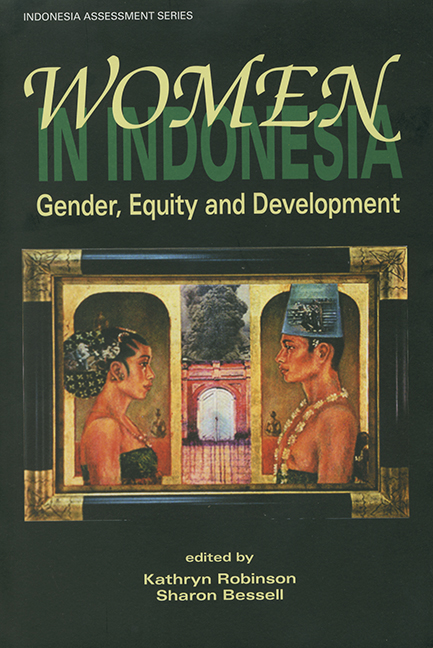Book contents
- Frontmatter
- Contents
- Tables
- Figures
- Contributors
- Acknowledgments
- Glossary
- Prologue
- 1 Introduction to the Issues
- 2 The Mega Factor in Indonesian Politics: A New President or a New Kind of Presidency?
- 3 The Downfall of President Abdurrahman Wahid: A Return to Authoritarianism?
- 4 The Year in Review: From Blind Man's Bluff to Mega Expectations
- 5 Further Comments on the Economy, with a Gender Perspective
- 6 Institution Building: An Effort to Improve Indonesian Women's Role and Status
- Commentary
- 7 Feminism in Indonesia in an International Context
- 8 Gay and Lesbi Subjectivities, National Belonging and the New Indonesia
- 9 And the Winner Is … Indonesian Women in Public Life
- 10 Indonesian Women Artists: Transcending Compliance
- 11 Literature, Mythology and Regime Change: Some Observations on Recent Indonesian Women's Writing
- 12 Women and the Labour Market during and after the Crisis
- 13 Women's International Labour Migration
- 14 Customary Institutions, Syariah Law and the Marginalisation of Indonesian Women
- 15 Women's Grassroots Movements in Indonesia: A Case Study of the PKK and Islamic Women's Organisations
- 16 Women's Activism against Violence in South Sulawesi
- 17 Gender Mainstreaming and Sex-disaggregated Data
- 18 The Changing Indonesian Household
- 19 Women, Family Planning and Decentralisation: New Variations on Old Themes
- 20 Men, Women and Community Development in East Nusa Tenggara
- References
- Index
- INDONESIA ASSESSMENT SERIES
7 - Feminism in Indonesia in an International Context
Published online by Cambridge University Press: 21 October 2015
- Frontmatter
- Contents
- Tables
- Figures
- Contributors
- Acknowledgments
- Glossary
- Prologue
- 1 Introduction to the Issues
- 2 The Mega Factor in Indonesian Politics: A New President or a New Kind of Presidency?
- 3 The Downfall of President Abdurrahman Wahid: A Return to Authoritarianism?
- 4 The Year in Review: From Blind Man's Bluff to Mega Expectations
- 5 Further Comments on the Economy, with a Gender Perspective
- 6 Institution Building: An Effort to Improve Indonesian Women's Role and Status
- Commentary
- 7 Feminism in Indonesia in an International Context
- 8 Gay and Lesbi Subjectivities, National Belonging and the New Indonesia
- 9 And the Winner Is … Indonesian Women in Public Life
- 10 Indonesian Women Artists: Transcending Compliance
- 11 Literature, Mythology and Regime Change: Some Observations on Recent Indonesian Women's Writing
- 12 Women and the Labour Market during and after the Crisis
- 13 Women's International Labour Migration
- 14 Customary Institutions, Syariah Law and the Marginalisation of Indonesian Women
- 15 Women's Grassroots Movements in Indonesia: A Case Study of the PKK and Islamic Women's Organisations
- 16 Women's Activism against Violence in South Sulawesi
- 17 Gender Mainstreaming and Sex-disaggregated Data
- 18 The Changing Indonesian Household
- 19 Women, Family Planning and Decentralisation: New Variations on Old Themes
- 20 Men, Women and Community Development in East Nusa Tenggara
- References
- Index
- INDONESIA ASSESSMENT SERIES
Summary
I was originally asked to write a paper on ‘Indonesian feminism in an international context’. I changed the title to ‘feminism in Indonesia’ because I am not sure that we in Indonesia have developed an Indonesian theory of feminism. From my experience as the past chair of the Graduate Women's Studies Program (Kajian Wanita) at the University of Indonesia, which is now ten years old, I know that we have accumulated much empirical data about women and women's issues, particularly in the theses written by graduate students. Based on these studies we have developed new insights about Indonesian women and women's issues in our country's varied cultural settings; but this does not yet constitute a body of knowledge which can be used to develop a distinctively Indonesian feminism. Hence I am reluctant to use the term ‘Indonesian feminism’.
Since 1998, when Indonesia began its transition towards a more democratic society, many women's groups have been working actively on women's rights issues within the context of feminism. Consequently the application of feminist ideas has become more visible, although I should add that in Indonesia feminism and women's rights are still the concern of a relatively small group of women and some men. At the start of the 21st century, feminism remains problematic for many Indonesians, especially those who are not directly concerned with women's issues or who are not familiar with the development of feminism in the north or in Asian countries such as India, the Philippines or Malaysia. The terms ‘feminism’, ‘feminist’ and even ‘gender’ are still questioned by the majority of Indonesians. They are considered by many to be non-indigenous concepts that are irrelevant to Indonesian values. Certain assumptions remain common: feminism is a Western or northern concept; it is anti-men; it perceives men to be the source of all gender inequity; it promotes the acceptance of lesbianism and so forth. This is despite the fact that the principle of gender equality is embodied in article 27 of the 1945 Constitution, and in other basic laws of the Republic of Indonesia.
In this chapter, I share my personal experiences as a women's studies scholar. I will discuss briefly the establishment of Kajian Wanita at the University of Indonesia.
- Type
- Chapter
- Information
- Women in IndonesiaGender, Equity and Development, pp. 80 - 91Publisher: ISEAS–Yusof Ishak InstitutePrint publication year: 2002



